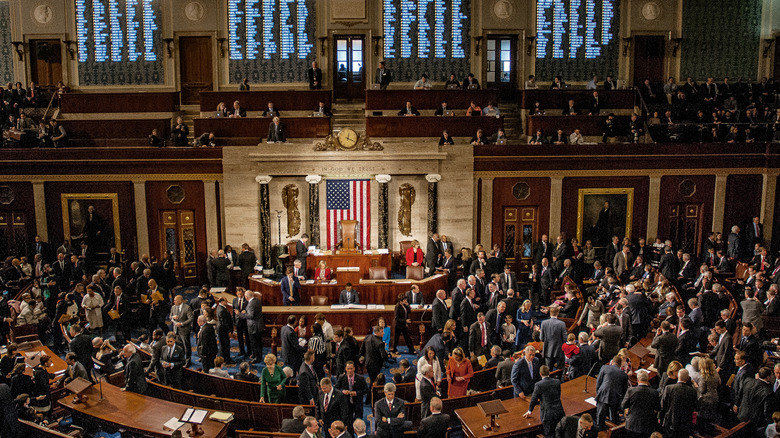What Is Contempt Of Congress?
Contempt of Congress has been trending across social media for the past 24 hours following the news that former Trump advisor Steve Bannon has been indicted with two counts, as The New York Times reports. What does that mean, and what it might lead to in the future?
Though the chief job of Congress is to create and pass laws, another important function is to perform Congressional investigations. As the House of Representatives' History, Art and Archives website explains, the Founding Fathers gave these investigative powers to Congress for two important reasons. The first was the hope that it would influence lawmakers to make good policy decisions, as they could be forced to defend their actions later in legal proceedings. The second was to add another check to balance the power of the executive branch. This foresight has helped protect American democracy by exposing multiple examples of governmental misconduct. Two of the most famous include the Teapot Dome scandal of the 1920s and Watergate in the 1970s.
During an investigation, legislators understandably need to have access to all kinds of potential evidence, and this is where contempt of Congress comes into play. If a person involved in the investigation does not supply requested evidence — such as emails, text messages, or testimony — Congress can cite that person as "in contempt" of its order, per Cornell Law School. There are three different types of contempt, and each one has a different potential legal process and punishment.
The 3 types of contempt
Those found in contempt of Congress face three different types of potential legal punishment, depending on whether it's inherent contempt, criminal contempt (also known as statutory proceedings), or civil contempt.
Inherent contempt is the most serious, though rarely used in modern times. In this scenario, the person is actually arrested by the Sergeant-at-Arms for whichever chamber brought the charges. As explained by The National Constitution Center, the Sergeant-at-Arms then brings the person cited with contempt of Congress onto the middle of the floor so that lawmakers can ask questions and decide on punishment, which can include imprisonment until criminal and civil contempt statutes can be passed. The last time it was used was in 1934, when the Postmaster General was being investigated for corruption, per The Washington Post.
The two more commonly used actions in modern times are statutory proceedings and civil procedures. In statutory proceedings, the person cited with contempt faces criminal charges. The appropriate U.S. attorney's office convenes a grand jury, which in turn decides whether or not to charge the person with contempt. Should the person be charged, he or she will face a trial that could end in fines and imprisonment.
A civil procedure is used mainly to enforce the subpoena so that Congress can get the requested evidence and rarely results in any form of punishment for the person cited for contempt. This is used less often than the statutory proceedings.
What's in Steve Bannon's future?
Steve Bannon (above) is not the first person to be cited with criminal contempt of Congress in recent years. During the Obama presidency, Attorney General Eric Holder was found in contempt of Congress after refusing to hand over documents relating to the Fast and Furious scandal. However, criminal charges against Holder were dropped by the Department of Justice — an outcome that was hardly surprising since Holder was head of the DOJ at the time, per the Associated Press. Though Holder wasn't charged, he was required to hand over certain documents to Congress.
What sets Bannon apart is that, unlike Holder, the charges were not dropped by the DOJ and a grand jury charged him with contempt. This makes him the first person to be charged in almost 40 years, per Snopes. It should be noted that the charge doesn't mean Bannon is guilty of anything per se; rather, it means that the grand jury believes that there is enough evidence to warrant a trial that could find him guilty.
That means that Bannon will soon be facing a criminal trial with a new jury that will decide whether he is innocent or guilty of contempt of Congress. If he is found guilty, he will be required to spend at least one month in jail and pay a fine of at least $100. However, according to the Congressional Research Service (posted at the Federation of American Scientists), he could face up to a year in prison and a $100,000 fine if hit with the maximum penalty.


